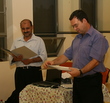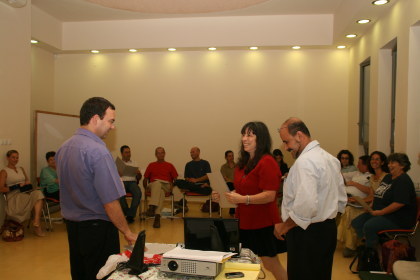Home > Oasis of Peace > Projects & Outreach > Doumia-Sakinah: The Pluralistic Spiritual Centre > Mediation in a multicultural context
Mediation in a multicultural context
Sunday 3 August 2008

A community named Oasis of Peace is surely a natural home for the study and practice of any non-violent method of dispute resolution, conflict management or conflict transformation. In 2008, over 30 years after Bruno Hussar’s vision of a multi-faith community was born on a hilltop near Latrun, the village’s educational repertoire continues to grow. A crosscultural community mediation training project is among the newest educational initiatives at Wahat al Salam / Neve Shalom.
This latest initiative has been introduced at the Pluralistic Spiritual Centre. It is a project called "Mediation in a Multicultural Context" and it is designed to include ideas, tools and methods drawn from diverse religious and secular traditions, cultural perspectives and ethnic communities. Especially worth noting: most participants in Phase I said they joined the course because it was being held at WAS-NS.
Participants thus far have included Arabs and Jews from all over Israel (including WAS-NS). The three stages of the project encompass: (1) a basic course in mediation from a multicultural perspective, for novice mediators - concluded in May 2008; (2) a more advanced in-service course for practicing mediators, stressing the multicultural contexts of mediation – to be given in 2008-09; and (3) a course to train mediator-trainers to provide mediator training oriented to the multicultural contexts of mediation. (See additional details below.)
Outcomes for Phase I have been notably positive. The planned cultural diversity in the group was richly evident throughout the course. There were many real-time interactions across cultural boundaries and the instructors led the group in analyzing typical scenarios, enhancing participants’ awareness of these dynamics. Instructive, original simulations were conducted in multicultural small groups. Participants formed multicultural pairs or groups of their own to tackle their final projects, presenting an overview of their plans at a final gathering on July 9, 2008 at the Spiritual Centre.
Between July and September, these projects will examine multicultural influences and perspectives on mediation from a variety of useful and interesting angles. One will look into the efficacy of a lawyer - psychologist mediator pairing to assess whether the combination of professional backgrounds, and "professional cultures," can offer added value for the client. Another will focus on the potential positive community impact of school-based mediation programs based on sulha traditions in Bedouin communities in southern Israel. A third is a very pertinent real-world case, wherein an Arab-Jewish mediator pair (both women) has offered assistance to Palestinian villagers and to their would-be employer (a Jewish-owned company in an industrial zone erected on confiscated Palestinian land): the goal is to achieve optimal outcomes both for villagers and for the company vis-a-vis the third party to the dispute - the Israeli government. Friends of WAS-NS will not be surprised to learn that the young Palestinian woman mediator who has chosen to tackle such an unusual case is a member of the second generation at WAS-NS, Ms. Shireen Najjar; her project partner is Ms. Adi Lustigman, an attorney and resident of the Village. These and several other equally original fieldwork and research projects will provide unique content for Phase II of this multi-year mediation program, commencing toward the end of 2008.
Written feedback confirms that participants enjoyed Phase I of the course very much; many are interested in continued participation. Phase II will focus on multicultural factors influencing how conflicts evolve and unfold, and on tools and processes that are important in resolving conflicts between parties from different cultures, interwoven with the original material from the Phase I fieldwork projects.
Thanks… Phase I was made possible through the generous support of the German Friends of Neve Shalom / Wahat al Salam and a contribution from the Evangelische Kirche in Hessen und Nassau, and the support of the Spiritual Centre, which contributed the facilitator’s time and some course expenses not otherwise covered.
Phase II of the project could begin in Winter 2008, if funding is found to cover the costs.
Details of Phase I of Mediation in a Multicultural Context (spring 2008)
The first course (Phase I of the project) opened on February 27, 2008 and ended on May 21, 2008, with a post-program final session on July 9, 2008. This featured a summation by one of the region’s premier scholars of mediation training, Dr. Lee Leon, chief of the Mediation and Community Conflict Resolution Department at the Ministry of Justice. Mediator Certificates were presented to the graduates, and all enjoyed a light buffet courtesy of the Spiritual Centre.
Each of the 12 regular sessions ran for 5 hours, once a week, on Wednesday afternoons, at the Pluralistic Spiritual Centre of Wahat al Salam / Neve Shalom. The project is a joint effort of the PSC and Wi’aam (an NGO engaged in community mediation with Arabs and Jews). The course was led by Abdessalam Najjar and Yonatan Naftali, who also supervised the simulated mediation sessions together with Ilan Amitai of Wi’aam; simulations sessions were also led by Rafi Sahar and Ariel Lavie. Dorit Shippin, director of the PSC, provided the administrative supervision.
The 19 participants in this course included 12 Jews and 7 Arabs, 9 men and 10 women. Eight of the participants were from Wahat al Salam / Neve Shalom. Professions represented were diverse: the law, economics, management, and behavioral sciences, among others.
The program covered:
– Introduction to conflict resolution; various models.
– Sources and dynamics of interpersonal and inter-group conflict; multicultural conflict.
– Acquaintance with ADR (alternative dispute resolution); mediation as a facilitated negotiation process; stages in the process.
– Models for managing negotiations; tools for building dialogue.
– Traditional methods and approaches to conflict resolution in various cultures.
– Mediation and consensus building in the community.
– Ethics, fairness and neutrality.
The course was conducted via lectures with Q&A, group dynamics exercises and analysis, and simulation games. There were three special guest lectures: on mediation between citizens and government over land, and on the sulha process as a tool for resolving conflicts in Palestinian Arab society; and, during the final meeting, an overview of mediation in Israel by Dr. Lee Leon, among its earliest proponents in the country and a well-known expert in the field.
Participants received notebooks with basic material on mediation, prepared by the Gome Mediation Institute, plus other articles on mediation and material written by the facilitators. A group social identity emerged among participants in the course, and a special Intranet site (a "comuna") was opened for their shared use on the Hebrew-language site Tapuz, where members posted thoughts, questions, and responses along with relevant materials from other Web sites.
Course requirements included: participation in 80% or more of the sessions; study of the materials; and a preview presentation of a final fieldwork or research project. Successful completion of the course entitled participants to a mediator certificate recognized by the court system in Israel.
This program gives every indication of having tremendous potential to contribute on many levels — at WAS-NS, at the Spiritual Centre, in Israeli society, and perhaps beyond. The virtual comuna will remain active, as members are already planning regular get-togethers for mutual help and support during the conduct of their fieldwork and research projects.
